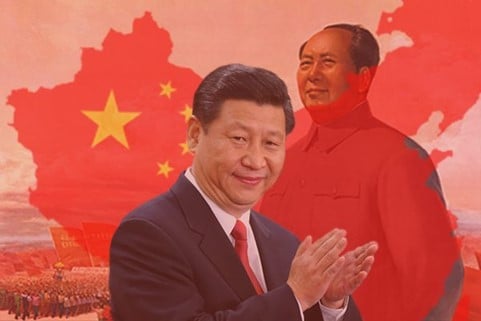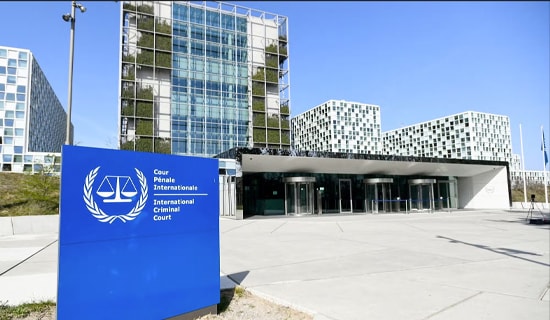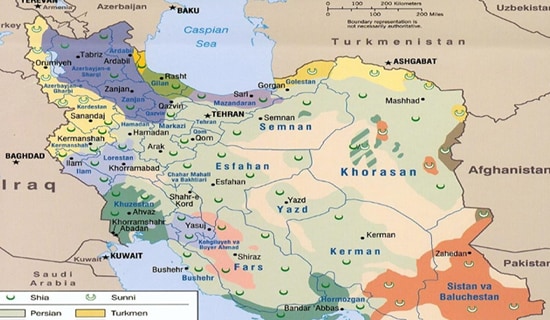To mark its 100th anniversary, the Chinese Communist Party (CCP) recently released the latest edition of its book A Brief History of the Communist Party of China. An online account, Ouzhou Jin Xue analyzed the differences between the previous edition of the book, published in 2001, and the 2021 edition.
According to Ouzhou Jin Xue, the 2021 edition emphasizes the primacy of Mao Zedong as Party leader and Marxist thought leader, Marxism as a catalyst for ethnic unity, the army's close identification with the people, and the Cultural Revolution as a developmental phase in China's construction of socialism. Removed from this edition are Mao's so-called "70-30" formula, according to which Mao is 70 percent right and 30 percent wrong, and Deng Xiaoping's criticism of the Cultural Revolution. This edition also specifically credits Mao's "superb art of military command."
Having established Mao's role as skilled leader in action and Marxist thought, the 2021 edition concludes with a new chapter on "Xi Jinping Thought on Socialism with Chinese Characteristics for a New Era." It describes Xi's thought as providing the Marxist theoretical framework for pragmatic action in governance, military reform, and diplomacy. Xi is portrayed as the picture of leadership consistent with that of Mao Zedong.[1]
Below is the analysis from Ouzhou Jin Xue:[2]

(Source: Facebook.com)

(Source: Mypitaya.com)
Mao Zedong's Command Was Crucial To The Success Of The Red Army
"I have read and compared carefully the 2001, 2011, and 2021 editions of 'A Concise History of the Communist Party of China.' I will talk about briefly some of the changes that have caught my attention. As the difference between the 2011 and 2001 editions is not that great, I will focus mainly on the 2001 and 2021 versions, which are 20 years apart.
"First of all, a very noticeable change is in the section on the Long March.
"The latest version of 'A Brief History' specifically stresses the historical significance of the crossing of the Jinsha River after the Zunyi Conference. It also emphasizes that the key to freeing the Red Army from military containment by the Kuomingtang's reactionary military forces lies in Mao Zedong's command. His leading position was established at the Zunyi Conference held in January of 1935.
"In the old edition (2001) of 'A Brief History,' the crossing of the Jinsha River is mentioned with just one sentence: 'After crossing the Jinsha River, [the Red Army] freed itself from the encirclements, pursuits, blockades and interceptions by hundreds of thousands of Kuomintang troops.'
"But in the new version (2021), it is described in much more detail:
"'After the Zunyi Conference, the Central Red Army under the command of Mao Zedong and others flexibly changed its combat directions, took roundabout routes and diversions, maneuvered and interspersed among the heavy enemy troops based on the changes of actual situations. From the end of January of 1935 to late March, the Red Army crossed Chishui River four times and in late March, moved towards the south and crossed the Wujiang River, feigning an attack on Guiyang. Chiang Kai-shek, who was overseeing battles in Guiyang, urgently ordered the Yunnan Army to reinforce Guiyang. As soon as the Yunnan Army moved out, the Red Army immediately rushed into Yunnan in a bold move, and its front troops reached Kunming. The Yunnan authorities ordered reinforcements to defend Kunming in a hurry, thus weakening the defense along the Jinsha River. The Red Army suddenly turned northward and crossed the Jinsha River in early May.'
"At the same time, the important role of Mao Zedong as the core of leadership is added to the new version:
"'By now, the Central Red Army threw off the encirclements, pursuits, blockades and interceptions by the hundreds of thousands of Kuomintang troops, smashing the plan of Chiang Kai-shek to encircle and wipe out the Red Army at the borders of Sichuan, Guizhou and Yunnan, and achieving a decisive victory in its strategic retreat or withdrawal. This victory was achieved after the change of the central military leadership and was a clear demonstration of Mao Zedong's superb art of military command.'
"Looking back at history, the successful strategic retreat to the north would have been impossible without the miracle of crossing the Jinsha River. From a tactical point of view, the crossing of the Jinsha River was one of the shining historical moments when the Red Army won with less troops and turned passive retreating into active maneuvering. It was also a major demonstration of 'focusing on strategic mobility' in Mao Zedong's military thoughts.
Marxism As The Key To Interethnic Unity
"All these points are not described in detail in the old edition of 'A Brief History,' but are just mentioned in a sentence or two.
"For instance, the old edition uses just one sentence to mention the historical moment that, during its retreat to the North, the Red Army passed through the mountain area in Liangshan where the Yi ethnic group lived. But the new version focuses on it in detail:
"'After the Central Red Army crossed the Jinsha River, it continued to move northward. While entering the Yi ethnic territory in the Daliang Mountains, Liu Bocheng, the chief of the general staff and Xiaoye Dan, the leader of the Guoji Tribe of the Yi ethnic group, formed a blood-sworn alliance, securing the smooth passage through the Yi area for the Red Army, which then hurried to Anshunchang Ferry on the south bank of the Dadu River.'
"The most crucial thing for the party's ability to unite all possible forces during the revolution was utilizing the Marxist point of view to unite the peoples of all ethnic groups and to liberate different clan forces.
Mao As The Main Representative Of The Correct Marxist Party Line
"The new version of 'A Brief History' also has an additional description of the Marxist nature of Mao Zedong's leadership position when talking about the significance of the Zunyi Conference:
"'The Zunyi Conference was a crucial turning point concerning its life or death in the Party's history. It was held at the historical juncture when the Red Army had suffered a defeat in its fifth Anti-encirclement Campaign and severe setbacks at the early stage of the Long March. It de facto established Mao Zedong's leadership position in the Party's Central Committee and the Red Army; it also paved the way for establishing in the Party's Central Committee the leadership position of the correct Marxist party line with Mao Zedong as its main representative. It started to form the first generation of collective central leadership with Mao Zedong as its core, which opened up a new phase for the Party to independently solve the practical problems of the Chinese revolution. It saved the party, saved the Red Army, and saved the Chinese revolution at the Party's most critical moment.'
The Long March Forged A Bond Between The Red Army And The People
"The two versions of 'A Brief History' have significant differences in their narrative of the larger meaning of the victory of the Long March. The new version lavishes praise of about eight hundred words, pointing out that the Long March not only tempered and refined the revolutionary force, but 'won the support of the people,' saying it 'relied closely on the masses and aligned with the people to depend on each other for life and death.' There are none of these phrases in the old edition, just a short paragraph about the sacrifices in the Long March.
"The new version even lavishes praise on the well-known Red Army story of 'Half a Quilt' (advocated by Xi Jinping), amplifying the emotional bond between the Red Army and the people. It quotes Mao Zedong's remarks to illustrate the historical significance of the Long March directly: 'The Long March is the first of its kind in the annals of history. The Long March is a manifesto. The Long March is a propaganda team. The Long March plants seeds for a future harvest.' But in the old edition, only a few remarks of Mao Zedong are directly quoted, and none of Mao's quotations are ever cited in the section on the Long March.
The Cultural Revolution Is Now Recast As 'The Construction Of Socialism,' A Period Of Great Progress On All Fronts
"The section that I personally pay the greatest attention to is the history after the founding of the PRC in 1949, particularly the first twenty-seven years.
"With the 8th National Congress of the CPC and the completion of the Three Great Transformations in 1956 as a divider, both the old and the new versions use 'Exploration' as the theme for Chapter Six.
"In the old edition, the section on the Great Proletarian Cultural Revolution is taken out separately as the independent Chapter Seven. And the title of the chapter is blunt and shocking: 'The Domestic Turmoil of Ten Years of Cultural Revolution.' In this chapter of the old edition, more than 90% of the text negates and completely dismisses the history of the ten years. Much of the narrative is overgeneralized and the citing of historical facts selective, which is really hard to accept.
"But there is a huge change in the new version. The history of the Cultural Revolution is embedded in Chapter Six, 'The Exploration and the Tortuous Development of the Construction of Socialism.' And terms like 'domestic turmoil' and 'catastrophe' are barely used throughout the chapter.
"Besides this, the new version says that the chaos or turmoil did not last throughout the ten years, but only in the early years of the Cultural Revolution, and it 'mostly occurred in the cultural and educational fields, and Party and government agencies.'
"As for the rest, the new version is very straightforward:
"'Most of the production systems were not disrupted. Especially, the five-year adjustments had laid a good foundation for the development of the national economy. Therefore, various production and construction undertakings still achieved relatively good results in 1966. After 1969, with the domestic situation stabilized to some extent, Zhou Enlai and other leaders presiding over the work of the government seized upon the opportunity to resume the work of major industrial and other comprehensive economic departments, and strengthened the planned management of the economy. The national economy in 1969 reversed the continuous decline of the prior two years and bounced back. During the economic construction of 1970, the construction of the inland strategic rear base (focusing on the construction of the national defense industry) was quickly and fully rolled out. The local 'Five Small' Industries (small steelmaking, small machine making, small fertilizer production, small coal mining, and small cement making) experienced rapid development. By the year's end, the economic indicators of the year and the leading indicators of the 'Third Five-Year Plan' were substantially achieved.'
"Take note that the narration of the economy here in the new version is deliberately not too specific: the economic decline occurred in the first two years of the Cultural Revolution and it began to rebound immediately in 1969.
"I recall in the lesson on the Cultural Revolution in middle school textbooks, that every time it said that 'the Cultural Revolution led to economic collapse,' but the chart given only covered the three years from 1966 to 1968. I can only laugh to myself.
"Subsequently, from the pages 207 to 213, the entire length of more than 4,000 words is used to fully elaborate on our country's achievements in economy, science and technology, industry, infrastructure, agriculture, military, culture, diplomacy, etc. during the Great Proletarian Cultural Revolution. This section can be hailed as crushing all the impressions and rumors about the Cultural Revolution.
"There are too many examples, so none will be excerpted here.
The Cultural Revolution Is Cast In A Positive Light, As Deng's Criticism Is Omitted
"The paragraph I do want to extract includes also the sentence that introduces the great achievements of our country in various fields in the ten years of the Cultural Revolution. The new version of 'A Brief History' adds a reflection on the Cultural Revolution. These following two sentences are nowhere to be found in the old edition:
"'The 'Cultural Revolution' as a political movement was different from the 'Cultural Revolution' as a historical period. During this period, our country's national economy experienced great ups and downs, but with the joint efforts by the party and the people, various tasks still achieved important progress despite the difficulties.'
"This sentence, designed to prevent certain Western forces from dismissing the New China and the Chinese Revolution by smearing the Cultural Revolution, originally came from the Party resolution passed in 1981.
"It is, however, not used in the 2001 edition of 'A Brief History.' It is very interesting that it is quoted in the new version of 'A Brief History.' Meanwhile, the evaluation of the Cultural Revolution by Comrade Deng Xiaoping quoted in the old edition is also deleted decisively: 'We thoroughly negate the Cultural Revolution, but it should be said that the Cultural Revolution also had merit: it provides a negative example serving as a lesson....'
"It is not that none of Deng Xiaoping's quotations are cited in the section on the Cultural Revolution in the new version. There is one on page 209:
"'These major achievements in the field of science and technology, especially the achievements in the cutting-edge defense technology, not only strengthened our country's comprehensive national strength and strategic defense capabilities, but also had great political significance. Deng Xiaoping later said, 'If China did not have atomic and hydrogen bombs, and did not launch satellites since the 1960s, China could not be considered a major country with important influence and it would not have its current international status.''
"These changes are really loud and clear.
"At the end of the section on the Cultural Revolution, the old edition of 'A Brief History' cites an excerpt from the Party resolution in 1981, having a lengthy evaluation on Chairman Mao Zedong's so-called '70:30 formula,' in which it is declared that Mao is 70 percent right and 30 percent wrong. It also repeatedly emphasizes the so-called 'errors' of the Cultural Revolution.
The Cultural Revolution Now Integrated Into The History Of The Early Years After The Founding Of The PRC
"But in the ending of the section on the Cultural Revolution in the new version of 'A Brief History,' the Cultural Revolution is integrated into the long history of the first 27 years after the founding of the People's Republic of China. And a magnificent evaluation and definition of the 27 years is also made. I extract the following:
"'From the founding of New China to the end of the 'Cultural Revolution,' was a historical period in which our Party led the people to arduously explore the path of socialist revolution and construction. Although it experienced severe setbacks, it still gained original theoretical results and great achievements.
"'Our Party led the people to pursue high-spirited socialist construction that was unprecedented in Chinese history on the basis of the sheer poverty and backwardness of the old China. In a short period of time, our society underwent earth-shaking changes and established an independent and relatively complete industrial system and national economic system; independently developed the 'Two Bombs and One Satellite,' safeguarding national sovereignty and security effectively; and became a major power with important influence in the world. Our society also accumulated important experience on socialist construction in China, a major power in the East which had a history of a very backward level of social productivity.
"'Our Party strived to explore the path of socialist construction in conformity with China's national conditions and gradually reached some very important understandings: proposing to shift the focus of work of the Party and the country to socialist construction and technological revolution; proposing to go its own way and to explore the path of socialist construction suitable for China's national conditions; putting forward the basic contradiction and principle contradiction of a socialist society, in which the basic task was to develop productive forces; putting forward the two steps of socialist modernization, thus unveiling the two-stage development plan of China's socialism; putting forward that commodity production and commodity exchange still existed in a socialist society, the rules of use and exchange values must be respected, and commodity production must be vigorously developed; putting forward the importance of correctly distinguishing and handling any contradiction between ourselves and the enemy, on the one hand, and the contradiction among the people themselves on the other.
"'These original theoretical results and great achievements provided valuable experience, theoretical preparation and material foundation for ushering in the socialism with Chinese characteristics in the new historical period.'
"Regarding the Cultural Revolution, I want to add one more point: the old edition of 'A Brief History' has a lot to say about the Lin Biao Incident and the so-called Lin Biao Clique, which are heavily criticized and negated. But in the new version of 'A Brief History,' they are downplayed and barely mentioned.
"As for the truth of the Lin Biao and Lin Biao Incident, it might foreshadow the unraveling of mystery surrounding him someday in the future.
Discourse On Xi Jinping Thought Linked With Socialism With Chinese Characteristics
"The last part of the new version of 'A Brief History' is also a core addition, which is 'Socialism with Chinese Characteristics Enters a New Era' starting from Chapter 10.
"This chapter systematically expounds the theoretical system of Xi Jinping Thought on Socialism with Chinese Characteristics for a New Era, from the governance of the Party to the largest military reform in the history of our armed forces and to the diplomatic thinking with the core concept of 'community with a shared destiny for mankind' etc., including reshaping the leadership of the Party.
"Although it is just 'A Brief History,' it is systematically discoursed on, and I personally recommend it.
"I will not cite more excerpts here. You can read them by yourself.
Postscript
"Six days ago, on April 20th, Zhuang Rongwen, who is Deputy Minister of the Propaganda Department of the Communist Party of China, Director of the Office for Central Cyberspace Affairs Commission, and Director of the Cyberspace Administration of China, presided over a meeting of education and study of Party history. The area of focus was the period of socialist revolution and construction.
"At the meeting, Director Zhuang Rongwen clearly quoted the ending of the section on the Cultural Revolution in the new version of 'A Brief History:'
"'The 27 years from the founding of New China to the end of the 'Cultural Revolution' were the 27 years during which the Party led the peoples of all ethnic groups across the country to work diligently and perseveringly, to explore actively and to make a determined effort to gain great achievements in the socialist revolution and construction. Although this period was full of difficulties, arduousness, and even major setbacks, on the whole it made progress amid the exploration and developed through twists and turns. The achievements were impressive and eye-catching. The basic system of socialism was established comprehensively and began to be built. Tremendous historic progress was achieved. It gradually explored the path of socialist construction suitable for China's national conditions and achieved important positive outcomes, created a peaceful international environment conducive to socialist construction, and provided valuable experience, theoretical preparation, and material foundation for ushering in socialism with Chinese characteristics in a new historical period."
"The old edition showered the 1980s and even the 13th National Congress of the Communist Party of China in 1987 with lengthy praises; but in the new version, all of these are simplified and downplayed.
A Resurgence Of Mao Zedong Thought And 'Revolutionary Passion'
"The people-centered principle is returning, the original communist ambition is regaining momentum and revolutionary passion is increasing.
"The situation is turning around. I hope that our comrades look at the changes with a calm attitude and refrain from being impatient.
"In the new era, stick to following the Party, remain committed to upholding the banner of Mao Zedong Thought, persist in studying and implementing the spirit of the 19th National Congress of the Communist Party of China, and stay unwavering!"
[1] See MEMRI Special Dispatch No. 9229, Chinese Dissident Wang Dan: Xi's Drive To Bring Hong Kong To Heel Is Part Of His 'De-Dengization' Policy; Xi Is Eager To Become The Second CCP 'Great Leader' After Mao – And Deng Is An Obstacle, March 12, 2021.
[2] Mypitaya.com/appshare?token=qf6UfO9hoGFbPsfsR7xfUKDdxmsNuaF3WmrzbbUiVXPX_PH0fG5L7oaOApx8meFf&continue
Flag=0313870484092c84d2dd42c7f8243062








